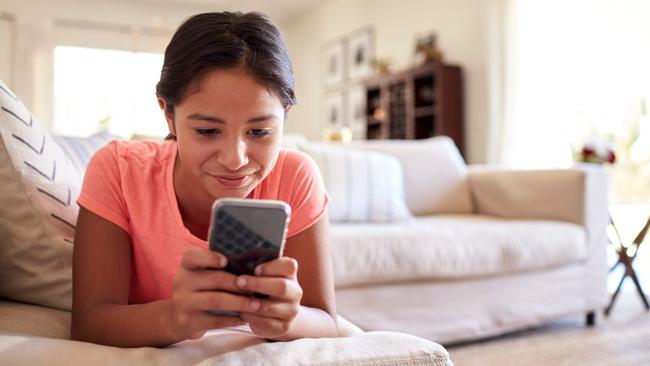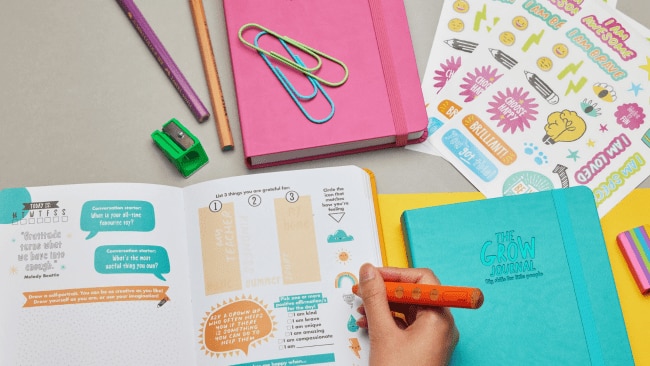'This is my advice to parents who can't get their kids off social media'
75% of children aged 12 dislike their bodies... but that's not even the worst of it. Here's one psychologist's tips.

High School
Don't miss out on the headlines from High School. Followed categories will be added to My News.
When I was in high school, social media was only just starting to take off.
Instagram was slowly breaking onto the scene, Facebook was a platform only people my mum’s age were using, Myspace was fizzling out, and Bebo (for those who remember it) was well and truly dead.
I’m so grateful that I could disconnect (literally and figuratively) from the pressures of how much I weighed, which products comprised my skincare routine (Mecca didn’t exist, so it was something cheap from the supermarket) and learning choreographed dancers.
Are you following us on TikTok? Head to Kidspot Official to watch our latest videos.
Social media’s unsocial impact
While I was lucky to escape the hold social media has on tweens and teens, a survey conducted last year by stem4, a youth mental health charity, has painted a pretty scary picture for parents of young adults.
An alarming stat revealed that 97% of 12-year-olds are on social media and have an average daily usage of 3.65 hours.
Despite feeling stressed, anxious, and depressed (70%), almost 95% feel helpless to quit social media due to peer pressure and social FOMO.
But while nearly all 12-year-olds are on social media, they aren’t always having a great time.
75% of children aged 12 dislike their bodies, with this figure increasing to 80% in the 18-21 age group.
50% of those aged 12-21 have experienced negative impacts on mental health due to online bullying or trolling about their appearance, and 71% of 18-21-year-olds continue using apps despite concerns about mental health impacts.
A different solution
Many parents around the world are tackling how their kids access social media. From limiting screen time to suing platforms such as TikTok, each approach is different and specific.
However, registered psychologist and author of "Teaching Kids to Be Kind," Rachel Tomlinson, has suggested one technique that could help tweens and teens navigate the feelings stirred up by regular social media use: Journaling.
RELATED: ‘TikTok ruined my 12yo’s life - I’m suing the app’

Dear diary
Rachel spoke exclusively to Kidspot on the benefits of journaling for young adults as a useful “daily practice to encourage self-reflection or even to help process things that have happened during the day.”
However, it can also “be used in a more targeted way,” she added.
“If a child is experiencing anxiety, journals could help them not only explore facets of their anxiety (triggers, thoughts and feelings) but also record how they feel after trying to tackle or manage these feelings, identify patterns, or how they have progressed and changed over time,” she said.
She gave several examples of when tweens and teens can employ journaling, including “In response to a stressful situation, or to help navigate something challenging (like worries about starting a new school, or in response to conflict with friends).”
It could also be used in situations where you think your child would benefit from “Wanting to track goals, progress and growth,” she suggested.
What to look for in a journal
Not all journals are created equally.
Journals like The Grow Journal are crafted specifically for tweens and teens.
These aren't your typical diaries and instead serve as companions in fostering positive self-talk, building a resilient mindset, and nurturing confidence.
The focus is on developing self-awareness and gratitude and recognising the power of individuality- something many teens shy away from.
What sets them apart from a blank journal is their practical toolkit addressing crucial aspects of young lives, such as friendships, body image, goals, and self-worth.
Similarly, The Kids Journal follows suit, offering a space for younger children to cultivate positive thought patterns, express emotions, and build resilience.
It's a safe space for mindful moments and a platform for kids to share their unique perspectives with important people in their lives.
RELATED: Tween is gifted Slim Tea by her parents in cruel prank

Tread carefully
While it may be tempting to skim through your child’s journal when they aren’t home, respecting their privacy is essential for fostering trust and independence.
Reading a child's diary can breach this trust and create a sense of invasion, hindering open communication.
A journal serves as a personal outlet for thoughts and emotions, allowing children to explore their feelings freely and invading this private space may lead to feelings of betrayal and hinder the child's ability to express themselves openly.
It's crucial for parents to strike a balance between guidance and respecting boundaries, enabling a healthy parent-child relationship based on trust and understanding.
So, before you start snooping around, travel back to when you were their age and imagine the horror of catching an adult reading your deepest darkest thoughts.
More Coverage
Originally published as 'This is my advice to parents who can't get their kids off social media'





